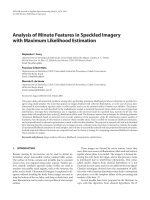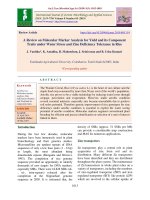Correlation analysis for agro-morphological features in upland cotton under rainfed conditions
Bạn đang xem bản rút gọn của tài liệu. Xem và tải ngay bản đầy đủ của tài liệu tại đây (123.23 KB, 4 trang )
Int.J.Curr.Microbiol.App.Sci (2017) 6(5): 2593-2596
International Journal of Current Microbiology and Applied Sciences
ISSN: 2319-7706 Volume 6 Number 5 (2017) pp. 2593-2596
Journal homepage:
Original Research Article
/>
Correlation Analysis for Agro-morphological Features in Upland
Cotton under Rainfed Conditions
K. Shiva Kumar1*, J.M. Nidagundi1 and A.C. Hosamani2
1
Department of Genetics and Plant Breeding, 2Department of Agricultural Entomology,
University of Agricultural sciences, Raichur, India
*Corresponding author
ABSTRACT
Keywords
Correlation,
Gossypium
hirsutum. L,
Seed cotton yield.
Article Info
Accepted:
25 April 2017
Available Online:
10 May 2017
Correlation studies were conducted by using 10 parents, 45 hybrids and one
commercial check of upland cotton (Gossypium hirsutum L.) suggested that
significant positive association of seed cotton yield with lint yield, number
of sympodia per plant, number of bolls per plant, number of monopodia per
plant, reproductive point per plant, lint index, Ginning outturn, plant height,
seed index and boll weight will play a major role in seed cotton yield
improvement and these characters should be considered as significant
selection criteria for yield improvement in cotton.
Introduction
Most of the characters are polygenic and
complex in nature governed by interaction
between numbers of elements. Knowledge of
relationship between yield and its components
traits is important in selection of high yielding
genotypes. Appreciable, importance has been
put on interrelationship between yield and its
component in cotton (iqbal et al., 2006).
Previous studies of Tyagi et al., (1998)
outlined that number of bolls and boll weight
directly contributed to boost seed cotton yield.
Phenotypic correlation coefficient between
boll number and seed cotton yield were
positive and significant were found by Baloch
et al., (1992). There are several factors which
influence the yield not only in cotton but also
in other crops most prominently the
environment where crop being grown and
Influence of morphological characters of
plants. Therefore, establishment of relations
among the different traits is important in
formulating selection criteria.
Numerous yield contributing traits such as
number of fruiting branches, number of bolls
per plant, boll weight, seed index, etc. it
desirable for breeder to have extent of
relationship between yield and its various
components in a particular environment
which facilitate him in selecting plants of
favorable
characteristics
combination
(Alkuddsi et al., 2013). Thus, the present
study is undertaken to estimate the
correlations between seed cotton yield and its
component characters in early generation F1
hybrids.
2593
Int.J.Curr.Microbiol.App.Sci (2017) 6(5): 2593-2596
Materials and Methods
45 F1 hirsutum cotton hybrids were generated
by crossing 10 parental genotypes of diverse
origin and consistency performance by mating
in half diallel manner. Assessment of F1
hybrids were laid down in a randomized
complete block design (RCBD) with two
replications at ARS, siruguppa during 201213 by accompanying a spacing of 60 cm
within and 90 cm between the rows with a
length of 6 meters.
All recommended agronomic and plant
protection measures were taken to raise the
good crop. Observations were recorded on the
middle five competitive plants from each
treatment in every replication. Mean vales
were used to calculated the correlation
analysis in accordance with Deway and Lu
(1959).
Results and Discussion
Simple correlation analysis is carried for all
possible combination of character to obtain
information about relationship and intensity
exit among them. The estimated correlation
coefficient for different Agro-morphological
feature in F1hybrids, their parents and one
commercial check Bunny were presented in
Table 1.
Seed cotton yield was significant and
positively correlated with ten traits namely
lint yield (0.987), number of sympodia per
plant (0.962), number of bolls (0.945),
number of monopodia (0.641), number of
reproductive point per plant (0.391), lint
index (0.266), Ginning outturn (0.255), plant
height (0.174), seed index (0.086) and boll
weight (0.022). Thus, selection for these
characters will assist breeder in selection of
genotypes with high seed cotton yield per
plant. Similar kinds of results were reported
by Kaushik et al., (2003).
Whereas lint yield was positively correlated
with ginning outturn, lint index, and number
of bolls per plant, plant height, number of
sympodia per plant, number of monopodia per
plant and number of reproductive parts per
plant.
Ginning outturn had positive intercorrelations
with the number of sympodia per plant,
reproductive parts per plant and number of
monopodia.
Boll weight was significantly correlated with
seed index, lint index and number of
monopodia per plant in the positive direction.
Seed index was positively correlated with lint
index, number of bolls per plant. While, lint
index was positively correlated number of
bolls per plant, number of sympodia per plant,
number of monopodia per plant and
reproductive parts per plant.
Number of bolls per plant had positive
intercorrelations with number of sympodia,
number of monopodia, reproductive parts per
plant and plant height besides, plant height
had intercorrelations with number of
sympodia,
number
of
monopodia,
reproductive parts, number of sympodia had
positive intercorrelations with number of
monopodia and reproductive parts however
monopodia with reproductive parts.
2594
Int.J.Curr.Microbiol.App.Sci (2017) 6(5): 2593-2596
Table.1 Correlation coefficients between different agro-morphological feature in upland cotton
SCY
LY
GOT %
B WT
SI
LI
NOB/PLT
PLT HT
SYMP/PLT
MONO/PLT
REP PTS
SCY
LY
GOT %
B WT
1
0.987**
0.255**
0.022*
0.086*
0.266**
0.945**
0.174*
0.962**
0.641**
0.391**
1.000
0.399**
-0.019
0.023
0.326**
0.934**
0.149*
0.946**
0.622**
0.433**
1.000
-0.220**
-0.307**
0.522**
0.259**
-0.065
0.226**
0.104*
0.345**
1.000
0.586**
0.340**
0.071
-0.009
0.020
0.108*
-0.128*
SI
LI
1.000
0.648** 1.000
0.060* 0.242**
0.049
-0.010
0.045 0.205**
0.058
0.120*
-0.116* 0.146*
* Significant at 5% level, ** Significant at 1% level
2595
NOB/PLT
PLT HT
1.000
0.140*
0.929**
0.639**
0.389**
1.000
0.186*
0.148*
0.111*
SYMP/PLT MONO/PLT
1.000
0.634**
0.367**
1.000
0.283**
REP
PTS
1
Int.J.Curr.Microbiol.App.Sci (2017) 6(5): 2593-2596
References
Alkuddsi, Y., S.S., Patil, S.M. Manjula, B.C.
Patil, H.L. Nadaf and Nandihali, B.S.
2013. Association Analysis of Seed
Cotton
Yield
Components
and
Physiological Parameters in Derived F1
Inter Specific Crosses of Cotton. BM.,
4(5): 23-33.
Baloch, M.T., A.R. Lakho and Salangi, M.Y.
1992. Unidirectional and alternate
pathways impacts of yield components
on seed cotton yield of G. Hirsutum L.
The Pak. Cotton, 36: 107-114.
Dewey, D.R., and Lu, K.H. 1959. A
correlation and path co-efficient
analysis of components of crested wheat
grass seed production. Agron. J., 51:
515–518.
Iqbal, M.M.A., Chang, M.Z. Iqbal, M.
Hussain, A. Nasir and Islam, N. 2003.
Correlation and path coefficient analysis
of earliness and agronomic character of
upland cotton in Multan. P. J. Agron., 2:
160-168.
Kaushik, K., C.J. Kapoor and Kohli, N.R.
2003. Association and path analysis in
American cotton (Gossypium hirsutum
L.). J. Cotton Res. Dev., 17(1): 24-26.
Tyagi, A.P., B.R. Mor and Singh, D.P. 1998.
Path analyses in Upland cotton (G.
Hirsutum L). Ind. J. Agri. Res., 22: 137142.
How to cite this article:
Shiva Kumar, K., J.M. Nidagundi and Hosamani, A.C. 2017. Correlation Analysis for AgroMorphological Features in Upland Cotton under Rainfed Conditions. Int.J.Curr.Microbiol.App.Sci.
6(5): 2593-2596. doi: />
2596









